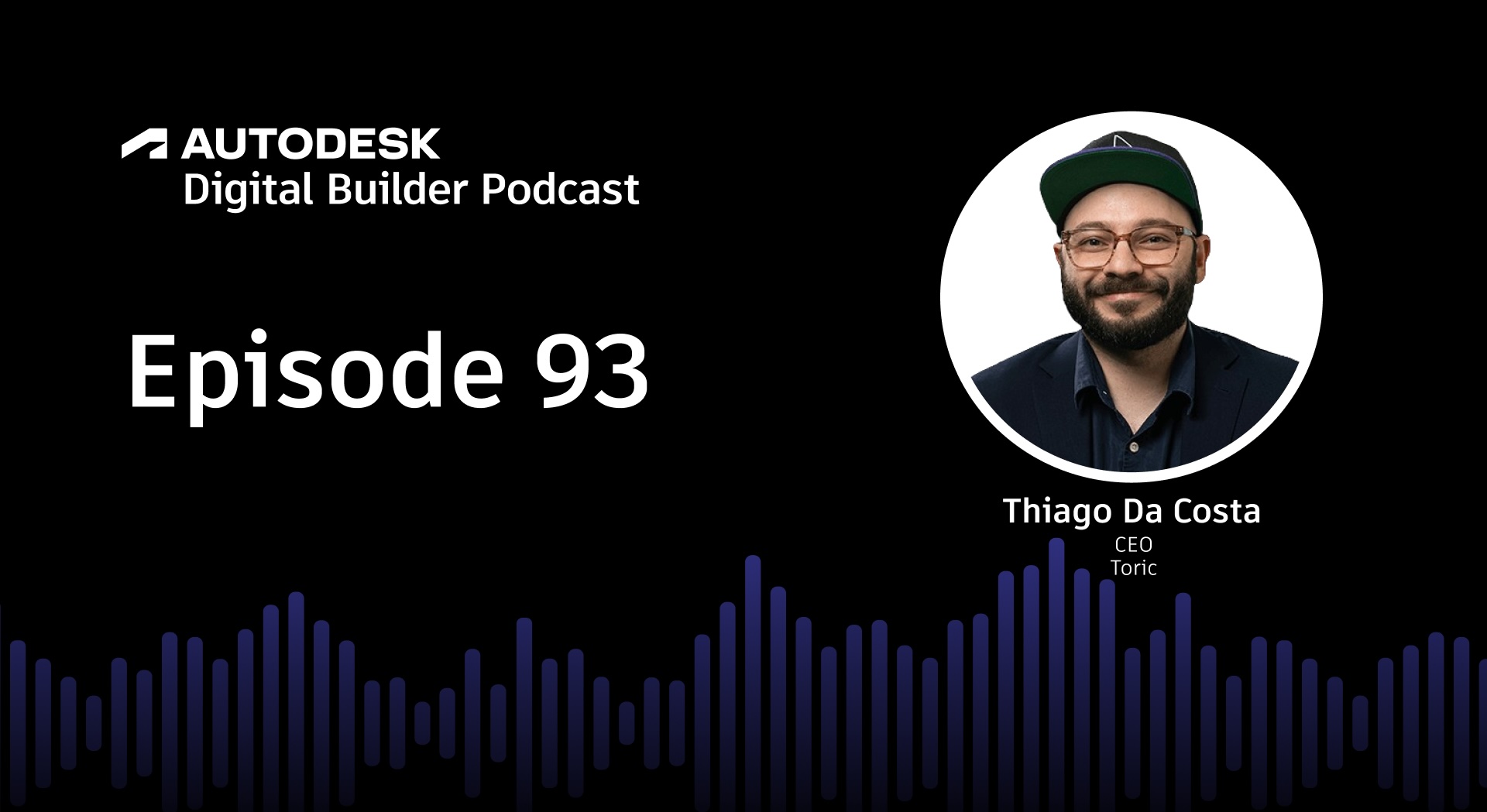Help us improve your experience. See content that is made for you!
See how IBM increased their efficiency by up to 30%!

Help us improve your experience. See content that is made for you!
See how IBM increased their efficiency by up to 30%!


Data is a topic that we've touched on quite extensively on the Digital Builder podcast. We've talked about best practices for collecting and sharing information, as well as how to create standards for data usage. But what about monetizing data?
Monetizing data is an approach that enables construction firms to turn their data into an asset, unlocking new revenue streams and enhancing decision-making processes.
Here to shed light on the fundamentals of data monetization is Thiago Da Costa, the co-founder and CEO of the no-code data platform Toric. Thiago discusses the strategies and tools necessary for construction firms to capitalize on their data assets and gain a competitive advantage so they can win more projects and provide even more value to clients.
You can also listen to this episode on Apple Podcasts, Spotify, YouTube, and anywhere else you get your podcasts.
We discuss:
The conversation kicks off with a discussion of the industry's data gaps and their impact on construction firms.
Thiago sees three major obstacles: an uneven landscape of data tools, a lack of integration between those tools, and insufficient organizational alignment regarding the importance of data.
Let's start with the first component. According to Thiago, the disparity in the quality and age of data tools creates significant challenges.
"We started off on pen and paper, then evolved into spreadsheets, and finally, we got into digital software tools that do specialized things. All of that created a very fragmented and uneven environment. Some software solutions are 20 years old, while others are a couple of years old, so you have a very different quality of data being created in these tools. And that comes with simple things such as required fields. If you don't have that data, you didn't capture it, and you won't have it."
He continues, "The other aspect is the tools weren't designed to talk to each other or to work together. So, how do you overcome that? Because every company uses dozens of tools to create buildings. Overcoming that challenge is a big part—just figuring out how to leverage it."
Finally, Thiago brings up the need for organizational alignment on the value of data.
"The third gap is the alignment of the importance of data. If your company is not aligned, you might be missing an opportunity."
When these gaps aren't addressed, they can acutely hinder a firm's day-to-day operations and long-term growth.
From an operational perspective, not having robust data practices hampers team productivity, which results in inefficiencies, miscommunication, and costly errors.
As Thiago puts it, "I think ultimately it's going to come down to how efficient the project is in terms of producing outcomes for the company, how much you can extract from a project, and how effective your teams can be."
Without the correct data, you won't have the insights you need to identify the drivers of project success and determine the ideal conditions for your company.
And that leads to even broader challenges that could hamper your firm's ability to stay competitive.
"The impact is that you won't be able to keep up with whoever's been investing in data for a while. That's the rush; how do you catch up quickly so that you can become more of a data organization that creates better financial outcomes for the company?"
Thiago also discusses the byproducts of having the right data solutions and processes. He points out that better insights can help improve safety, which in turn lowers insurance premiums.
He emphasizes that leveraging data is a long game and team sport.
"The whole company has to be committed to it, and it's a top-down decision," he remarks.
"If you have a couple dashboards somebody built—that's cool, but ultimately it's the entire executive leadership team that decides you're not just making buildings, you're actually managing these projects for a better outcome, and you're using data as a key way to do it.”
There's no doubt that data is incredibly valuable and can enhance everything from safety and productivity to business strategy and innovation. But if you want to uplevel your data strategy, you need to start seeing it as more than a tool, but as a strategic asset that can provide investment and monetization opportunities.
Data drives a competitive advantage and positions your firm as a leader in the industry.
Thiago states, "Data is not an investment that's supposed to just improve your internal operations. It's an investment that increases the capacity to monetize a project. And that comes from the fact that owners are more interested in working with companies that are better at managing themselves and their data. If you are perceived as data- and tech-forward, owners are more likely to give you the project."
As far as actually earning revenue from data, Thiago believes that owners are increasingly willing to pay for analytics and reporting services.
"We're seeing people selling dashboards. You can have dashboards; you can have analytics reporting. Those are line items in the bid. In the same way that you charge for software, we're seeing people charge for those outcomes," he explains.
He also points out that owners typically hire other providers or consultants to deliver these data-driven insights and services. So rather than handing the opportunity to a third party, why not offer these valuable services directly and capture the additional revenue yourself?
And if you want to think even bigger, consider aggregating and anonymizing data to offer advanced predictive insights.
"Ultimately, can you aggregate the data and monetize the specifics of it? Can you anonymize and provide better predictions? Owners will trust you more by having access to those data sets, which are unique to your company and your area of operations," adds Thiago.
If data monetization piques your interest, Thiago recommends taking a few steps to shift your mindset and approach.
If you haven't done so yet, make sure you're collecting data.
"If you're not collecting your data today, you're probably missing out, so the first thing is to begin collecting the data—all the data. To process storage is minimal, and when you have to have as much data as possible, you should find the tools for curation," remarks Thiago.
"So, the first thing is collection. Then I think the next stage from there is curation, governance, and figuring out where to put it."
Alongside this step, you should also assess the value and potential applications of your data. Ask questions like:
"Those things eventually come together," explains Thiago. "Your technology roadmap advances your tools to a point where your needs are met, and then you start being effective at it."
Thiago cautions against trying to get your data strategy perfect the first time. The most important thing is to take action and iterate. As you continue on the right path, actions for handling and monetizing your data will develop.
"Don't try for perfection; just start leveraging your data. Start by figuring out how you can turn those data capabilities into a bid. How do you get paid to do it?"
He continues, "I would say there's a roadmap there. First, you could manage your finance data. Then you can tackle your project data and centralize the information. And then there's everything else—your scheduling data and safety data, and it can go in many directions."
Digital Builder is hosted by me, Eric Thomas. Remember, new episodes of Digital Builder go live every week.

May we collect and use your data?
Learn more about the Third Party Services we use and our Privacy Statement.May we collect and use your data to tailor your experience?
Explore the benefits of a customized experience by managing your privacy settings for this site or visit our Privacy Statement to learn more about your options.